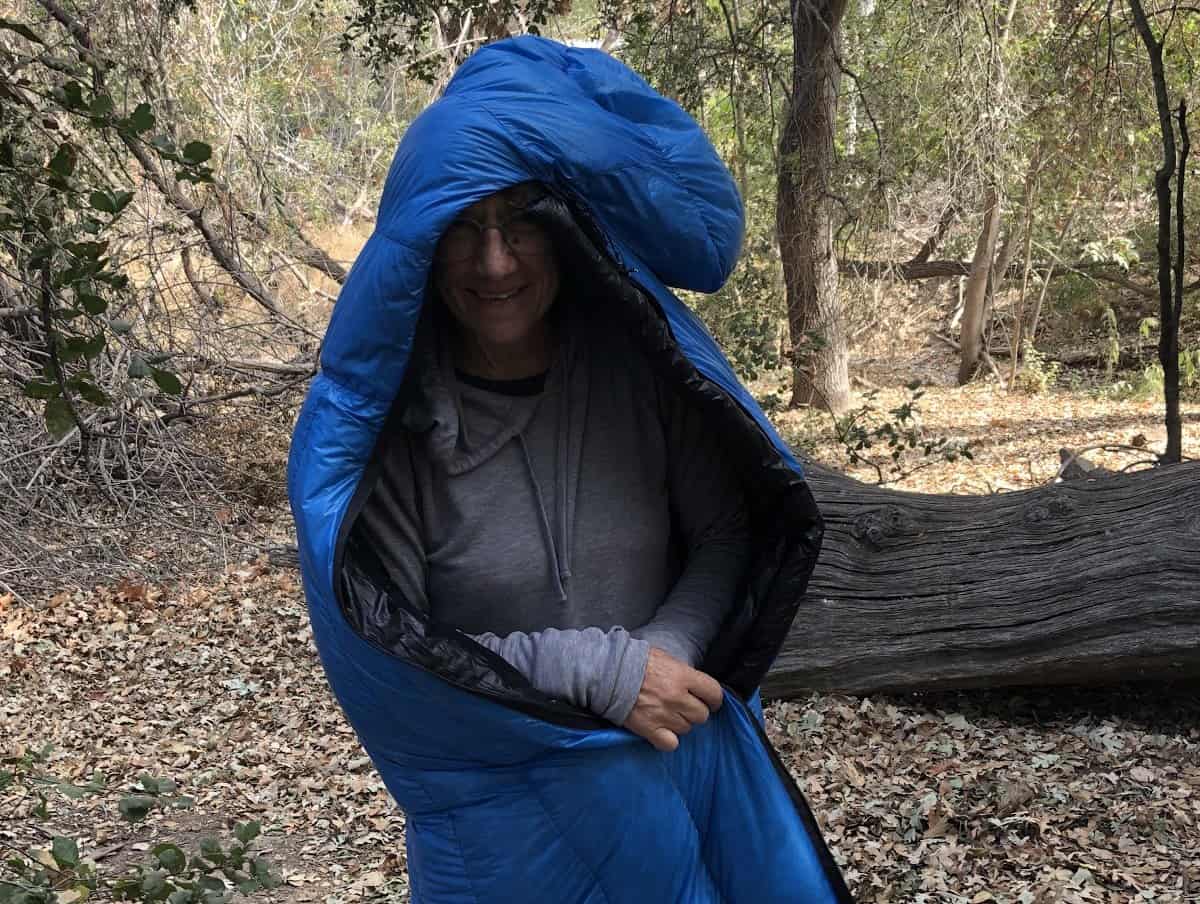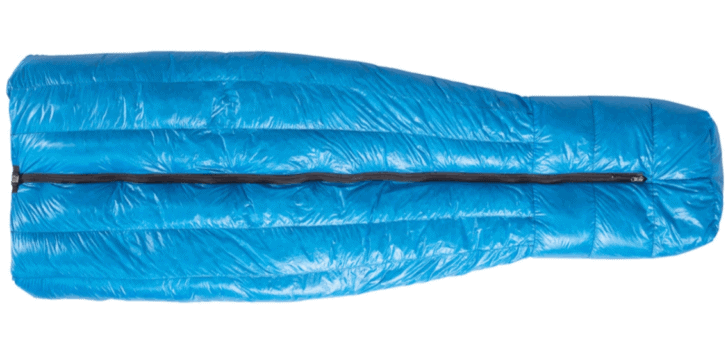SUMMARY
ZPacks Sleeping Bag Review (Full-Zip Version)
This ZPacks Full-Zip Sleeping Bag review features an RDS-down certified, full-zipper, ultralight (7 denier shell and lining) sleeping bag that weighs 15+ oz and retails for $349+.
Photo: ZPacks
Highlights
- Good value (quality, performance, and weight) for the money
- Excellent warmth-to-weight ratio
- High-quality, truly ultralight materials
Where to Buy:
Introduction
ZPacks offers three models of solo sleeping bags (note: in addition, they offer a couples’ quilt): the Zpacks Solo Quilt, the ZPacks Classic Sleeping Bag, and the ZPacks Full-Zip Sleeping Bag. All three are hoodless bags. Two have zippers (the ZPacks Classic offers a 3/4-length zip, and this review features the full-length zipper version). Zippered versions can be unzipped and used as a quilt. Because the zippers run down the center of the bottom (or top) side, they are more usable as a quilt than side-zip bags or bags with mummy hoods.
Weights of the ZPacks Full-Zip Sleeping Bag range from 14.7 oz (417 g) to 28.7 oz (814 g) depending on temperature rating and sizing (length and girth). Hoodless sleeping bags occupy a space between traditional mummy bags, which can be confining for some, and quilts, which, although less confining, can be drafty.
Zpacks Sleeping Bags are constructed with vertical baffles on the upper body and with horizontal baffles around the foot box. DownTek water-resistant 950 fill-power goose down fills the baffles. The inner and outer shells are 7 denier Ventum ripstop nylon with a “C6” durable water repellent (DWR) finish (finished weight .59 oz/yd²). The Full-Zip bag is feature-rich and among the warmest-for-weight full-zip bags available in the hoodless category.
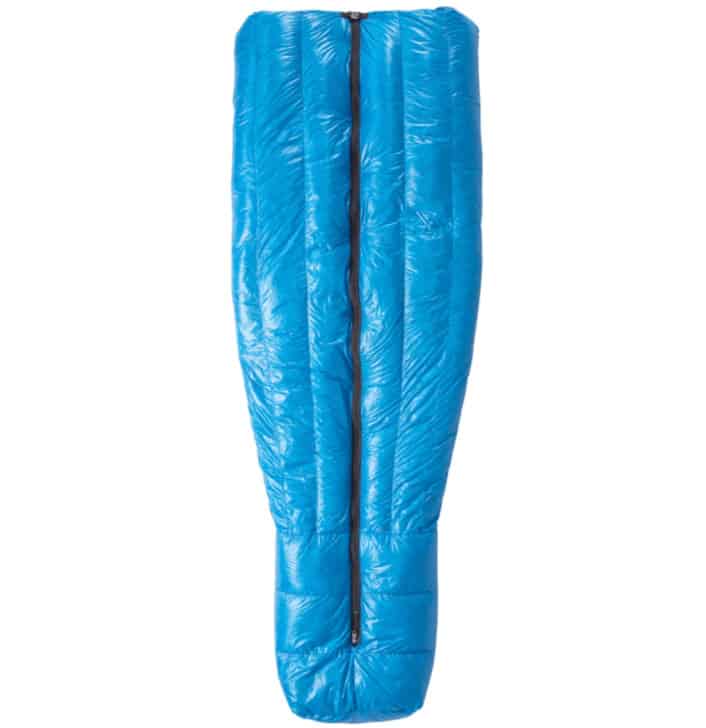
Features and Specifications
Features
- Overstuffed to offset future down loft degradation
- Vertical baffles in the upper body area
- Rectangular foot box
- Black fabric on the inside for quick drying
- DWR treated shell and liner
- Full-length, two-way zipper extends to the last baffle
- Draft tube
- Zipper guard
- Flat clip at the top of the zipper (for zipper security)
- Elastic cord for draft management
- Includes a roll-top DCF dry-bag
- Two-year limited warranty against defects in materials or workmanship
Specifications (size medium/broad, 30 deg F)*
- Claimed weight: 17.2 oz (488 g)
- Measured weight: 17.63 oz (500 g)
- Temperature rating: 30 deg F (-1 deg C)
- Fill type: 950-fill-power DownTek hydrophobic RDS certified down
- Fill weight: 9.5 oz (268 g)
- Shell weight: 7.8 oz (220g)
- Dimensions: Stated actual measurements (circumference of fabric):
- Shoulders 65 in (165 cm)
- Hips 65 in (165 cm)
- Feet 40 in (101.5 cm)
- Measured length and width: 72 in (183 cm) x 30 in (76.2 cm) at top opening; fits up to 60 in (152.4 cm) girth
- Compressed dimensions: 6 in x 12 in (15 cm x 30 cm)
- Shell and lining fabric: 7d (0.59 oz/yd) Ventum Ripstop Nylon
*Unless otherwise noted, all future measurements and specifications will refer to the size medium/broad 30 deg F (-1 deg C) bag used for testing
Review Context / Description of Field Testing
My sleeping system includes:
- Pad: Therm-a-rest NeoAir Xlite in warmer and summer conditions, NeoAir Xtherm in colder conditions or when I am using a bag close to lower limits of its rating.
- Clothing: I usually sleep in merino wool long underwear (top and bottom) and socks in addition to merino wool sports bra and underwear. I stash my down jacket, down pants, and down booties in my bag while I am sleeping. Although I am not a particularly cold sleeper, I do not tolerate cold well and am generally prepared to be comfortable in temperatures 10-20 degrees below forecast.
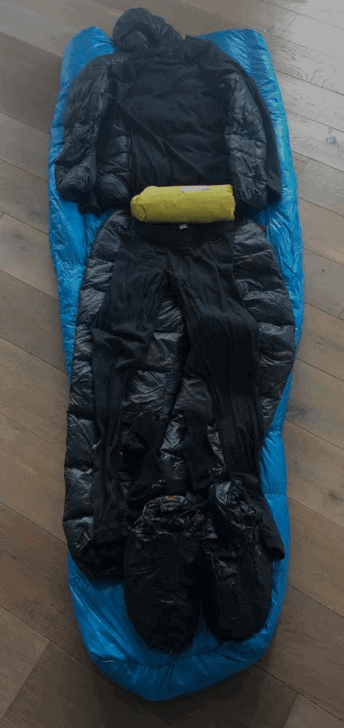
I tested the sleeping bag inside of a Locus Gear Djedi DCF-eVent Dome tent.
I used the Zpacks Full-Zip Bag in three locations across Northern California. This area is an ideal setting to test a 30F (-1C) bag. Days are mild with modest seasonal variation, but temperatures typically drop substantively with the sunset, although only rarely below freezing. Windy conditions are common and can factor into perceived warmth.
The first location was the “Lost Coast,” a rugged, northern-coastal, heavily wooded area which tends to be cool and damp. It did not rain during my stay. Daytime temperatures were around 50 F (10-15 C), and nighttime temperatures were around 40 F (5-10 C).
The second location was Candlestick Point, on the San Francisco Bay. Temperatures were warmer for this test – reaching 60 F (15-21 C) during the day and 50 F (10-15 C) overnight. I experienced wind during this test.
The third location was the east side of Angel Island in San Francisco Bay. This location was higher and drier, and more protected from the wind. Daytime temperatures reached 70 F (21-27 C) and dropped to 50 F (10-15 C) overnight.
Performance Assessment
I judged the ZPacks Full-Zip Bag’s performance on three factors:
- Comfort
- Ease of Use
- Durability
My assessment of comfort includes fabric and cut, as well as warmth. Ease of use includes features that ease typical activities as well as provide flexibility in different situations. Durability includes consideration craftsmanship as well as the resilience of the materials in the context of expected use.
I also made subjective and objective assessments of sleep quality and overnight recovery while testing the bag. I believe such assessments are indicators of sleeping bag effectiveness. For these evaluations, I used my observations (subjective) and data gathered from my Whoop and Garmin devices (objective).
Comfort
Warmth
Ensconced in a Zpacks Full-Zip Sleeping Bag wearing long underwear and socks, I stayed warm and comfortable during coastal California nights where temperatures dropped to 40 F (4 C). In the morning, when my metabolism ebbed, and temperatures reached a nadir, I started to feel a bit cool. At these times, I put on my down jacket and pants before getting out of the bag. While I suspect I could survive nighttime temps in the 30s F (0s C), I would probably be comfortable only if I added a down jacket and pants to my sleep clothing.
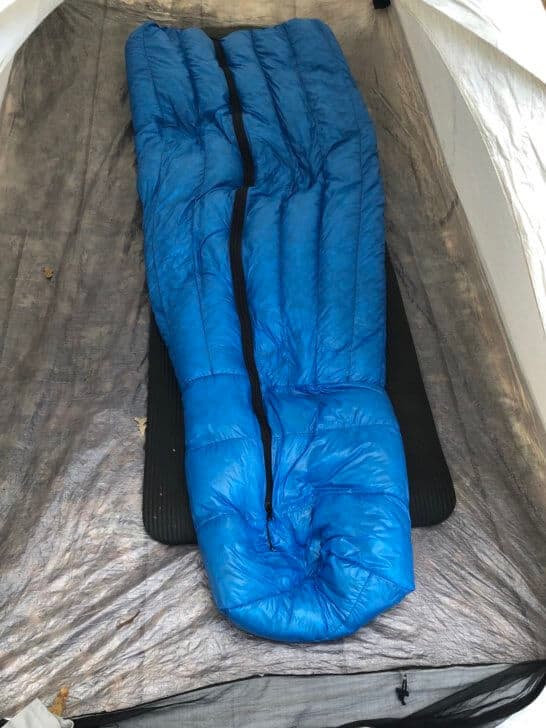
Fabric
In the San Francisco Bay area, it was too warm to sleep in my long underwear. Sleeping only in “standard” underwear gave me the opportunity to test the Full Zip Bag’s “skin feel.” The Ventum nylon fabric is soft and feels light and comfortable against the skin. It is easy to vent the bag as one gets warm; it unzips from both the bottom and top.
The ZPacks Full-Zip Sleeping Bag can also be unzipped completely and used as a quilt, and I used it this way on one of the warmer nights (more on this below under Ease of Use). Because it unzips completely, the ZPacks Full0-Zip Sleeping Bag can also be used as a cape to keep warm in camp.
I also found the Ventum fabric to be breathable. I regularly placed damp items inside the bag to dry while I slept and never encountered an issue with moisture accumulating inside of the bag.
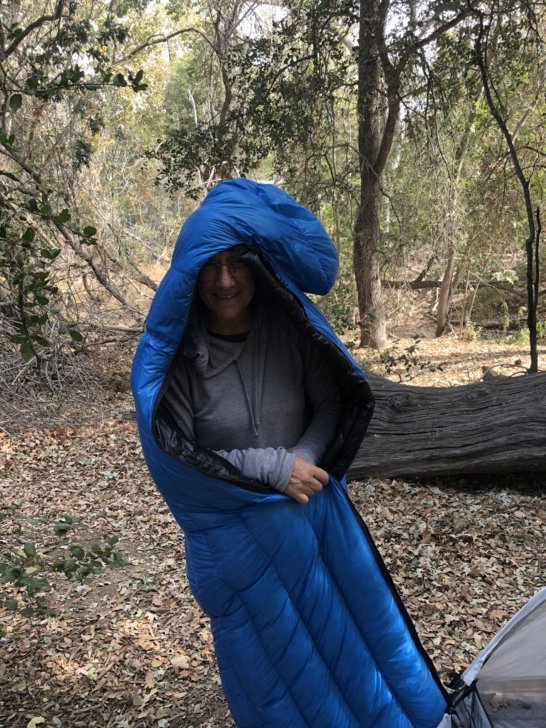
Cut
Although I am on the smaller side (5’4”/163 cm, 125 lbs/57 kg), I appreciated the roominess of the broad-cut bag. There was plenty of space to dry damp items, warm clothing, and stash electronics/battery chargers, as well as allow me to shift positions through the night.
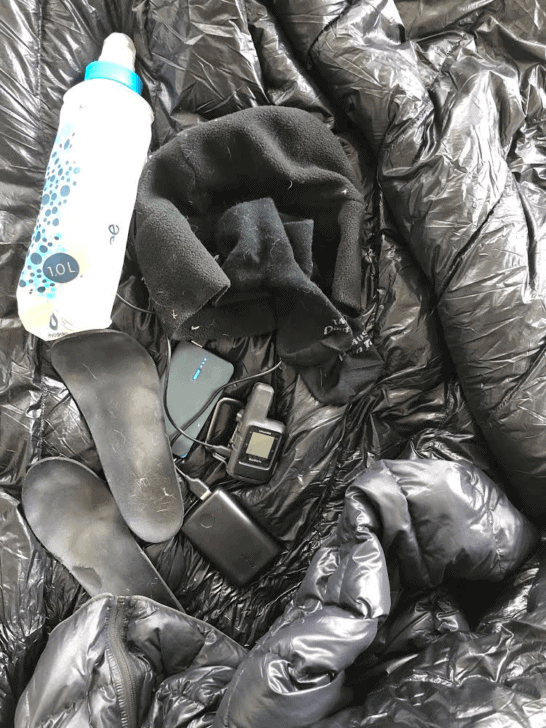
The foot box deserves special mention. It felt spacious and kept my feet toasty while wearing only thin socks. The foot box features a rectangular cut that accounts for its roomy feel.
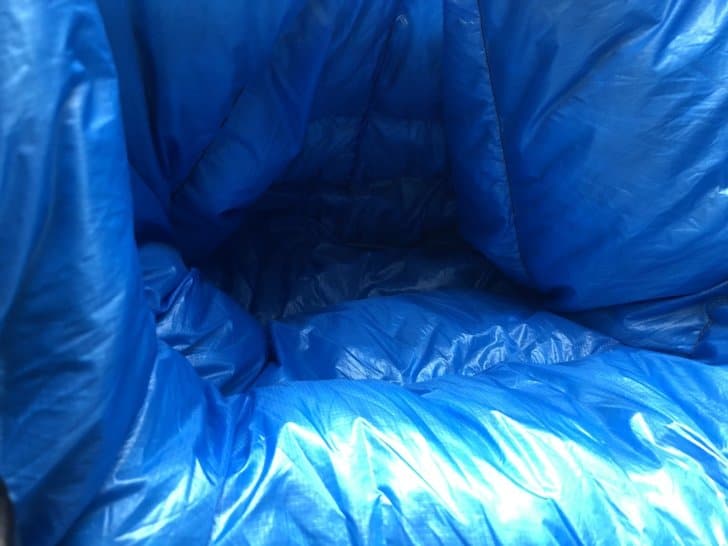
Ease of Use
Compression and Stuff Sack
The included DCF Roll Top Dry Bag allows the ZPacks Full-Zip Sleeping Bag to compress into a small package while keeping it safe from moisture. The inclusion of a DCF compression sack is a nice perk – keeping your insulation dry is essential, and a stuff sack like this would cost you upwards of thirty dollars if purchased separately. Even better, it only weighs 0.71 oz (20 g).
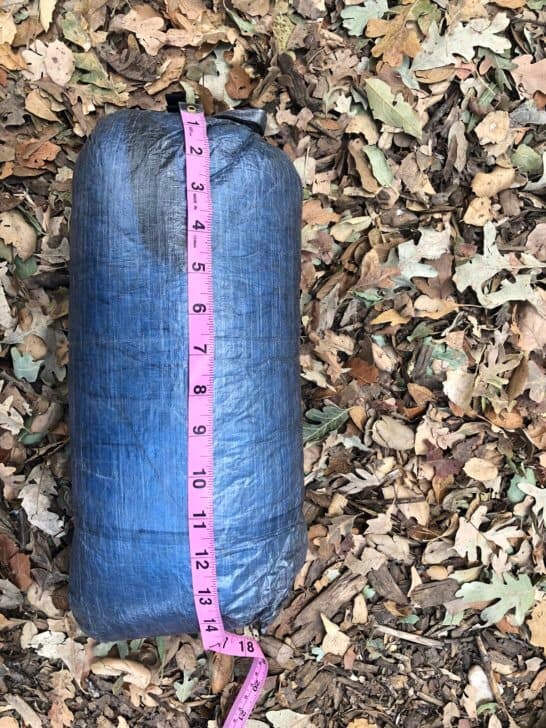
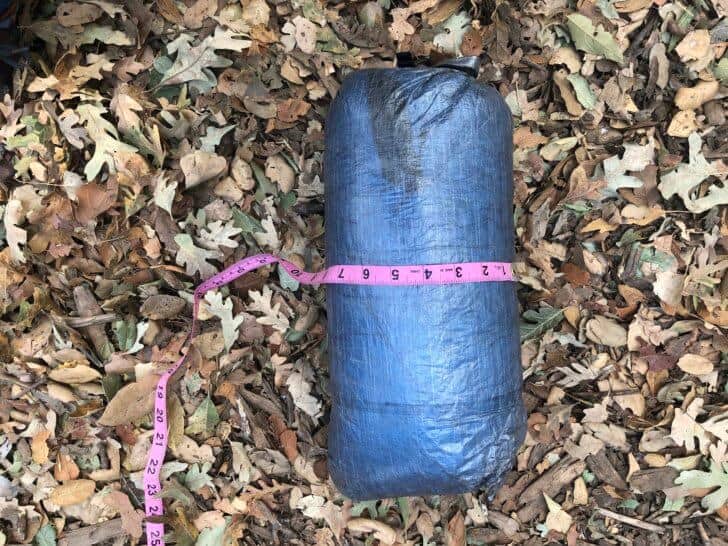
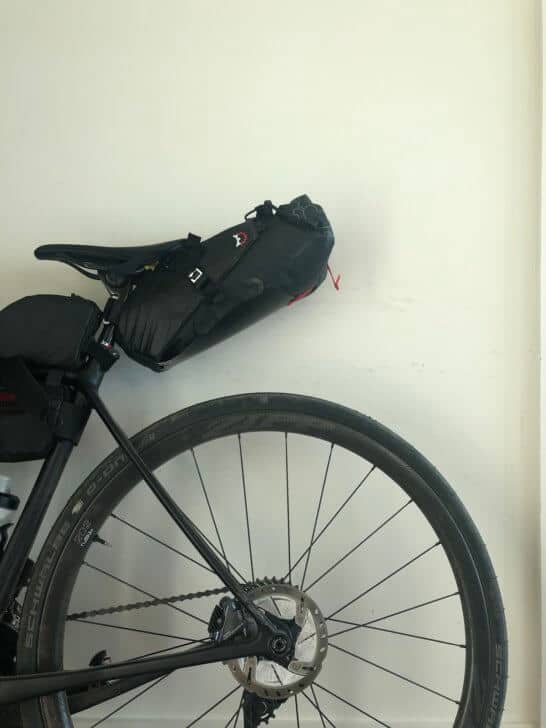
The Zpacks Full-Zip Sleeping Bag uncompresses and relofts quickly once pulled from the stuff sack. The width is generous, hanging a bit over the edges of standard width (20 in / 51cm) NeoAir XLite or Xtherm sleeping pads.
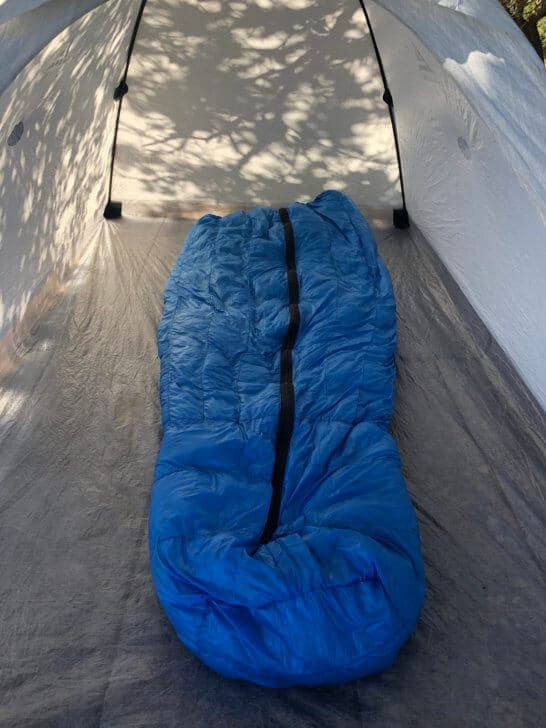
Space and Utility
There is lots of room to move around while sleeping and plenty of space to stick in clothes and other items you want to keep warm, dry, and readily accessible. The main issue I had was staying centered on the sleeping pad, which was smaller than the bag. This struggle was less an issue when I used the bag as a quilt – in that case, I could easily center my body on the pad and then drape the quilt over me. Even without straps attaching it to the pad, my body stayed covered.
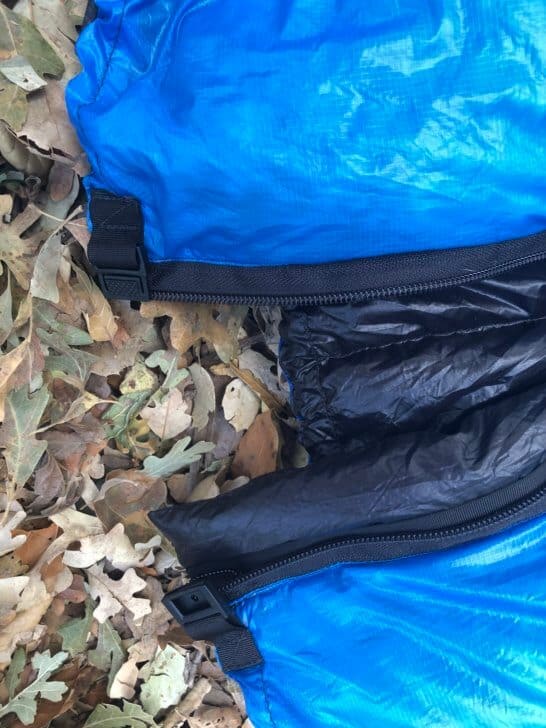
The zipper is covered with a down-filled baffle for draft control. The ZPacks Full-Zip Sleeping Bag is cut so that you can position the zipper wherever you find it most convenient. I tended to start with it on top to ease getting in and out and shift it to the side as I went to sleep (I am a side sleeper).
There is a tendency for the zipper to get caught in the baffle when zipping up or unzipping, because the zipper guard is not integrated into the adjacent fabric (like that used on more expensive down sleeping bags, e.g., Western Mountaineering). It is usually easy to “un-catch.” However, on one occasion, I got frustrated trying to get the zipper unzipped and finally just crawled out of the bag directly and sorted the zipper out in the morning. There is a flat clip at the top of the zipper that can be used to close the top of the bag when the zipper is open, or to provide extra security to keep the zipper closed. I did not find that I needed to use the clip.
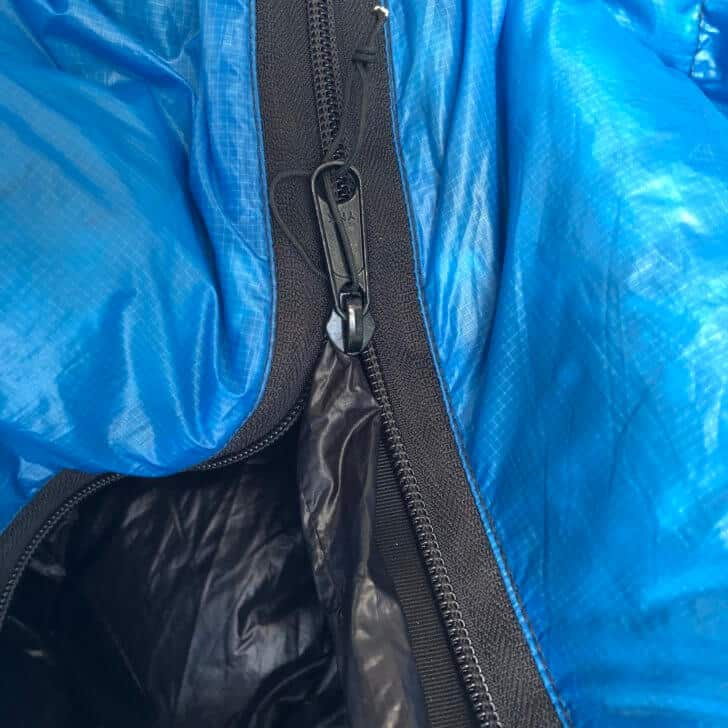
The Full Zip Bag comes with a drawstring around the top that one can tighten to cinch the bag at the top. With a bag a bit longer than one is tall (as was the case for me), the pull cord can be used to make a bit of a hood and cradle for whatever you use as a pillow.

Durability
The bag appears to be well constructed of high-quality materials. The inner and outer shells are made from 7D Ventum ripstop nylon (made in Japan) that has a finished weight of 0.59 oz/sq² (20 g/m²). The fabric is treated with a “C6” durable water repellent (DWR) and was effective in shedding light mist (it is not waterproof).
I encountered no issues with wear or durability during the period of evaluation. In the instances where the zipper caught the fabric of the baffle, it was possible to free it without tearing the baffle fabric. DownTek 950 Fill Power Water Repellent Goose Down fills the bag. This down is treated with a “C6” water repellent. The water-repellant is perfluorooctane sulfonate and perfluorooctanoic acid-free and reportedly stays dry over 90% longer than untreated down (I could not independently verify this claim). It is “Responsible Down Standard” certified, which assures that the animals are treated humanely (RDS claim). The down quickly and reliably regained loft after compression.
Recovery
Subjectively, I awoke feeling rested and refreshed each morning after a night sleeping in the bag. I track recovery (and stress) via a continuous heart rate variability (HRV) monitor. Despite considerable aerobic and travel stress during the days, recovery was excellent by this objective measure after every night I slept in the bag.
Granted, my HRV monitoring protocol shouldn’t be construed as a reliable indicator of sleeping bag performance (yet!). I’m still exploring this as a way to evaluate overnight performance of my sleep system, and the reader should not assume that my limited data equates to positive sleeping bag performance. It’s just an experiment for now!
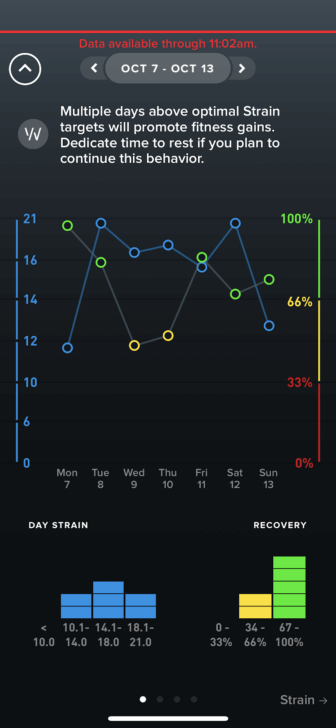
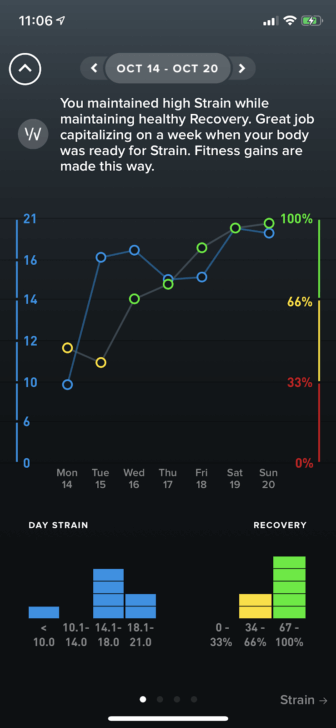
Strengths and Limitations
Strengths
- Excellent warmth-for-weight
- Multi-purpose – can be used as a bag, a quilt, or a cape to keep warm in camp.
- High-quality materials: Hydrophobic high-loft down and water-resistant fabric which feels very comfortable against the skin
- Roomy without cold spots.
- Provided stuff sack is a waterproof DCF Dry Bag.
Limitations
- Zipper does not work as smoothly as I’d hoped (but works fine if you are careful) and tends to catch on baffle and exterior fabric.
- Cold sleepers, and those less tolerant of the cold, may need to pair with insulated or heavier base layers below 40 degrees.
Compared To…
| Product | Zpacks Full Zip 30F | Enlightened Equipment Conundrum 30 | Feathered Friends Flicker 30UL | Western Mountaineering Summerlite | Zpacks Classic 30F |
|---|---|---|---|---|---|
| Weight | 17.2 oz (488 g) | 23.54 oz (667 g) | 23.6 oz (669 g) | 19 oz (539 g) | 15.1 oz (428 g) |
| Dimensions Length; shoulder width | 72 in (183 cm); 65 in (165 cm) | 72 in (183 cm); 64 in (162.5 cm) | 72 in (183 cm); 62 in (157 cm) | 72 in (183 cm); 59 in (150 cm) | 72 in (183 cm); 65 in (165 cm) |
| Temperature Rating | 30F (-1 C) | 30F (-1 C) | 30F (-1 C) | 32F (0 C) | 30F (-1 C) |
| Fill power | 950 | 950** | 950 | Not stated | 950 |
| Fill weight | 9.5 oz (269 g) | 13.07 oz (370 g) | 11.6 oz (329 g) | 9 oz (255 g) | 9.5 oz (269g) |
| Hydrophobic treatment | yes | no | no | no | yes |
| Baffle orientation | upper body: vertical, toe box: horizontal | vertical | horizontal | horizontal | upper body: vertical, toe box: horizontal |
| Zipper length | full | 3/4 | full | full | 3/4 |
| MSRP (USD | $409.00 | $345.00 | $429.00 | $435.00 | $379.00 |
**also available with 850 fill power
I included bags in the comparison table based on similar dimensions and temperature ratings. They are all hoodless, except the Western Mountaineering Summerlite, which is closer to a mummy-style and has a bit of a hood.
The Zpacks Full-Zip Sleeping Bag is the lightest full zipper bag, and its sister, the Zpacks Classic Sleeping Bag (with its ¾ length zipper), is the lightest overall. The Western Mountaineering Summerlite comes close in terms of weight, with approximately the same down fill weight, but is narrower and may feel more restrictive. The Enlightened Equipment Conundrum and Feathered Friends Flicker are heavier. However, they have more fill weight and will probably feel warmer to some users.
Commentary
The Zpacks Full-Zip Sleeping Bag is light, well-designed, and high quality. It deserves serious consideration as a component of a sleep system in moderate and mild climates. The ZPacks Full-Zip Sleeping Bag is reasonably true to its stated temperature rating – I get cold more readily than many and set my comfort at 10 to 20 degrees F (-12 to -7 C) above most sleeping bag temperature ratings. The compact size and flexibility make it well-suited for bikepacking. The tendency of the zipper to catch on the baffle can be annoying; however, it is manageable with care in zipping and unzipping.
The bag is truly cozy. I enjoyed the feel of the fabric, and I was surprised how much l liked the “broad” width. There was lots of room to move around and stash gear and lots of real-estate to wrap around my body when I opened the bag up. And it still compressed into a compact package that did not take up much room in my pack – it fits into the under-seat bag on my bike with room to spare for a down hoody and pants. I found the combination of the bag with insulated clothes to be more flexible than using a heavier (or warmer) sleeping bag with less clothing.
The bag performed well in a variety of environmental and wind conditions – however, I was not able to evaluate the bag in a hammock, in a tarp shelter, or while sleeping under the stars.
Review Rating

The 30F Zpacks Full-Zip Sleeping Bag is an excellent choice for backpackers and bikepackers looking for a feature-rich sleeping bag that is lightweight and compact. It is constructed of very high-quality materials and is exceptionally comfortable in cut and feel. The Full-Zip model also offers considerable flexibility in adapting to varying conditions.
The generous cut provides lots of room to move around as well as stash the clothing and electronics that I like to keep warm and with me through the night, and it was easy to vent and open up like a quilt when temperature conditions changed. Bottom line – the Zpacks Full-Zip Sleeping Bag is a super comfy place to spend a night.
The main negative was the zipper. It was annoying how often it caught on the baffle or exterior fabric. It was fairly easy to unsnag and was manageable enough, but it did not work smoothly, as I would expect a zipper on a bag at this price point and targeted quality level would. With improved zipper construction, I would give the Zpacks Full Zip Bag a “Highly Recommended” rating.
Where to Buy
- You can buy the Zpacks Full-Zip Sleeping Bag here.
Related Content
- Want something with a hood? Check out Mark’s recent review of the REI Magma 30 Sleeping Bag.
- Don’t need the zipper? The Feathered Friend Tanager is one of the best right now in terms of warmth-to-weight performance of zipperless, hoodless sleeping bags.
Disclosure
Updated November 7, 2019
- Product(s) discussed in this article may have been purchased by the author(s) from a retailer or direct from a manufacturer, or by Backpacking Light for the author. The purchase price may have been discounted as a result of our industry professional status with the seller. However, these discounts came with no obligation to provide media coverage or a product review. Backpacking Light does not accept compensation or donated/discounted products in exchange for guaranteed media placement or product review coverage.
- Some (but not all) of the links in this article may be “affiliate” links. If you click on one of these links and visit one of our affiliate partners (usually a retailer site), and subsequently place an order with that retailer, we receive a small commission. These commissions help us provide authors with honoraria, fund our editorial projects, podcasts, instructional webinars, and more, and we appreciate it a lot! Thank you for supporting Backpacking Light!
- Read about our approach to journalistic integrity, product reviews, and affiliate marketing here.

